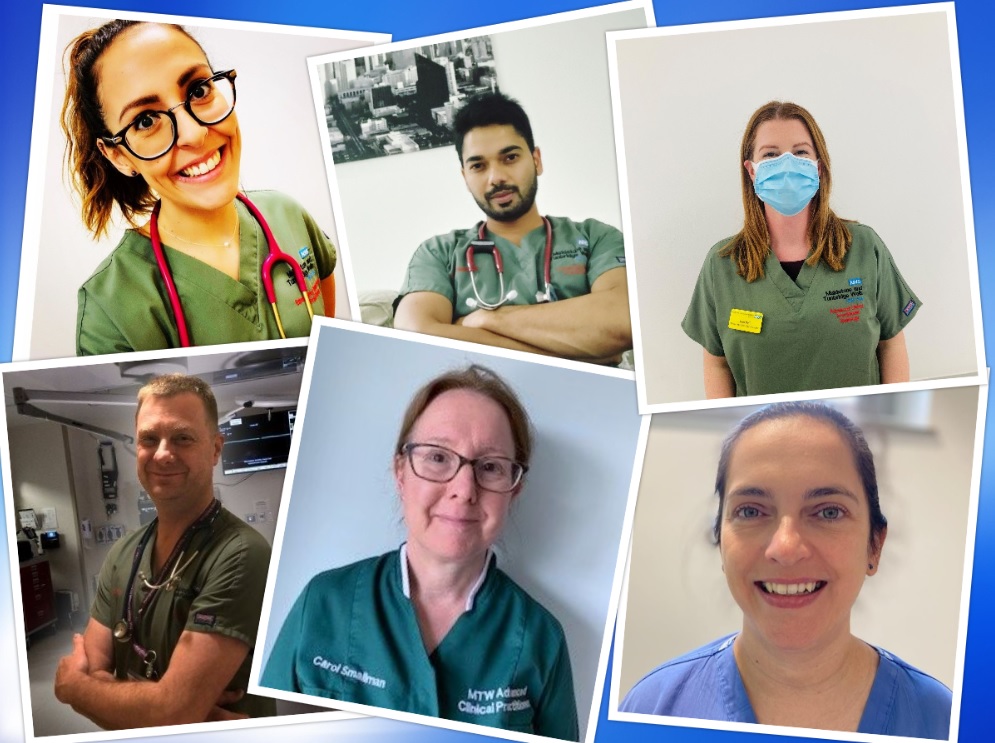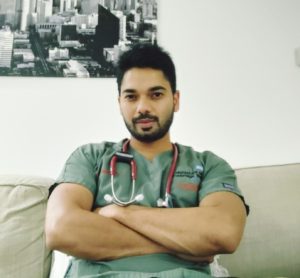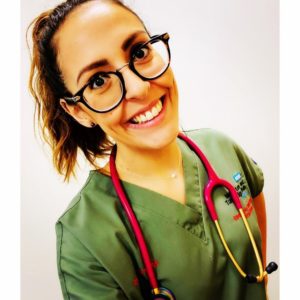
As the world marks #AdvancingPractice2022 throughout this week, we’re celebrating just some of our fantastic Advanced Clinical Practitioners (ACP) across the Trust!
Our ACPs come from a range of professional backgrounds such as nursing, pharmacy, paramedics and occupational therapy. They are healthcare professionals educated to Master’s level and have developed the skills and knowledge to allow them to take on expanded roles and scope of practice caring for patients.
Find out about just some of our ACP’s by reading on…
Naresh Nagalipalli
 When and where did you start your career as an ACP?
When and where did you start your career as an ACP?
I am a physiotherapist by core profession and it started with an intrigued conversation with one of the ACPs in Emergency Department while I was working as a clinical lead physiotherapist in ED in 2019. After that 10 minutes conversation I realised how fascinating and equally challenging path it is to expand the clinical boundaries. That moment I realised what I was missing in my job role, planned few career progression steps, executed in a right way and in 4 moths time secured trainee ACP role in Acute Frailty Unit MTW NHS. After completion of mandatory education and training recently got promoted to qualified ACP level.
What’s your role now – describe your typical day…
I equally share my clinical hours between Acute frailty Unit (AFU) and Ambulatory Emergency care (AEC). A typical day starts with a good morning smile and a big Hi to my colleagues, day gets busy with assessments, management discussions with consultants, planning investigations, future appointments for my patients and the day ends with a good-bye smile to my colleagues until I see them again.
How does your role as an ACP support the delivery of outstanding patient care at the Trust?
ACPs come from different professional backgrounds, possess various skill sets, brings different levels of experience , the overall clinical skills are refined and enhanced by a tailored university MSc programme and ongoing hospital-based training. As ACPS go through a thorough educational program and ongoing professional training they are a great asset to the trust in overcoming medical staff shortage and assist the trust in delivering on time patient centred care without compromising the trust values.
Raquel Gonzaga
 When and where did you start your career as an ACP?
When and where did you start your career as an ACP?
I started my career as an ACP in November 2019 at MTW ED. I started at MTW in 2013 as a Band 5 Staff Nurse and progressed my career into a band 6 Junior Sister and then band 7 Senior Sister. I have always been passionate about the clinical aspect of the nursing career and therefore didn’t see myself becoming a matron or a managerial person. I have always been interested in the ACP role ever since it was developed in ED and applied for the role when felt ready to take the next step.
What’s your role now – describe your typical day…
Currently we are rostered on the SHO rota in ED so there is no routine! We can see a wide range of patients in ED from minor illnesses to critically unwell patients. We work under direct supervision from ED Registrars and Consultants. We also cover the Minor Injuries patients as well as Paediatrics.
How does your role as an ACP support the delivery of outstanding patient care at the Trust?
We are a group of professionals who provide holistic care to our patients attending ED. We thrive for excellence and always put our patients and their needs first.
Kim Bell
When and where did you start your career as an ACP?
I qualified as a Diagnostic Radiographer in 2006 and soon knew that I wanted to specialise in Nuclear Medicine. Having found a training position, I enrolled on the PG Cert in Nuclear Medicine and completed my training in 2012. In 2014, two training opportunities became available in Nuclear Cardiology Stress testing, a test which was formally performed only by Consultant Radiologists, these were the first of their kind at Maidstone Hospital. Educational training meant enrolling on the PG Diploma in Advanced Medical Imaging at Salford University, whilst within the hospital, a Consultant supervisor and mentor, ensured I gained the clinical knowledge and skills required to fulfill my training portfolio, to eventually work independently.
What’s your role now – describe your typical day
Nuclear Cardiology Advanced Practice, is now well-established at Maidstone Hospital. My role consists of leading clinical sessions which see me triaging and assessing patients, performing pharmacological cardiac stress testing, managing any adverse reactions or complications during and post procedure whilst maintaining radiation protection for both patient, staff and members of the public during the process. I may also be supporting SpR’s in their training and other trainee ACP’s. I have leadership responsibilities as the site lead of Nuclear Medicine and actively participate in research and governance.
How does your role as an ACP support the delivery of outstanding patient care at the Trust?
Alongside the multidisciplinary team of Nuclear Medicine Consultants, a Consultant ACP, Specialist Radiology Nurses, Radiographers and Technologists, the ACP role helps patients to receive a timely diagnosis, whilst also enabling Radiologists to spend more of their time reporting.
 John Clulow
John Clulow
When and where did you start your career as an ACP?
I have been working in the Emergency Department (ED) since 1999 and trained to be an emergency nurse practitioner (ENP) in 2003. I moved to MTW in 2004 as an ENP and along with our Clinical Director, set up our Advanced Clinical Practitioner (ACP) service in 2017. We were initially a team of 6 ACP’s who all started the MSc ACP and worked towards the Royal College of Emergency Medicine (RCEM) curriculum for emergency medicine up to Speciality Trainee level 3 (ST3). We work across the 4 domains of advanced practice; Clinical, Educational, Leadership and Research. The team has grown to almost 30 ACPs over the last 5 years. My progression to consultant ACP came with supervisory responsibilities over the department where I act as an expert resource to the clinical staff, and consult on all four ACP domains and lead advanced practice within the MEC division.
What’s your role now – describe your typical day?
There is no typical day in ED. One day I can be running a cardiac arrest in Resus, or inserting a chest drain in to a trauma patient. The next day I can be working in minor injuries helping patients suturing their wounds, managing their sprains, manipulating or plastering their fractures. And the next day I can be working in the UTC consulting patients with conditions like tonsillitis, UTI or other minor ailments.
How does your role as an ACP support the delivery of outstanding patient care at the Trust?
The role of the ACP helps put the patient at the centre of the care we offer. Where we are able to manage the entire episode of care from booking in to discharge or referral. We are able to responsive to the needs of the department due to our flexibility, helping with both medical or nursing duties. The ACP team have been key in developing new processes and pathways such as SDEC for the delivery of care.
What do you like best about your role?
I love the fact that I am able to work in such a varied environment, in a patient facing role, where o feel I am able to make a difference to the care of many patients each day. I have the opportunity to meet many other fantastic members of staff around the trust who are forging pathways for advanced practice.
Ruth Cousins
When and where did you start your career as an ACP?
I started my career as an ACP in 2001 when I commenced my BSc Hons in Neonatal Studies at Southampton University (based clinically here on the Neonatal Unit at Tunbridge Wells Hospital).I initially worked as a Neonatal staff nurse at Princess Royal University Hospital at Farnborough, Kent, for a couple of years after qualifying as a paediatric nurse in 1996 and completed my neonatal specialty training (ENB 405) and ENB 998 Teaching and Assessing course during that time. I then joined Tunbridge Wells Neonatal Unit in 1998 and became a Neonatal Sister after a couple of years. I started my training as an Advanced Neonatal Nurse Practitioner in 2001 and have been in post here as an ACP since 2002. I am currently completing my MSc in Neonatal Medicine at Cardiff University.
What’s your role now – describe your typical day?
My days are very varied and often comprise all four pillars of Advanced Practice. I work on the middle grade medical rota, and therefore carry the emergency neonatal bleep. I attend the daily ward round (sometimes leading the round), and am involved in decision-making for the care and management of babies on the Neonatal Unit, Delivery Suite and postnatal ward. After the ward round, any subsequent decision making/changes in care will be made by myself, unless the baby is very unstable. This includes attendance at births where advanced resuscitation may be required – my role in this is as team leader. I am also involved in complex procedures such as endotracheal intubation, insertion of central lines and arterial lines, chest drains, cranial ultrasound scanning and echocardiography. I am involved in education of parents and staff (medical, nursing and allied health professionals) both planned and ad hoc sessions. I also counsel parents: antenatally regarding potential preterm delivery and postnatally regarding their baby’s care and condition. This can include giving upsetting news such as significant changes on cranial ultrasound with long-term consequences. In terms of leadership, I lead resuscitation at birth on a regular basis, and also lead the ward round occasionally. I chaired our neonatal network nutrition group and led on the implementation of standardised parenteral nutrition within the network last year. I am the lead research nurse for the Neonatal Unit. We are currently involved in 3 national trials, and my role involves recruiting babies into the studies, training of staff, keeping eCRFs up to date and resolving any queries. I have also led on a number of audits over the years, which have led to changes in practice.
What do you like best about your role?
I enjoy my role due to the amount of patient and parent contact I get, and seeing babies develop from sick and unstable at admission through to successful discharge. I also appreciate the challenge of carrying out complex procedures and the high variety of my work on a day-to-day basis. I enjoy being part of a very supportive multidisciplinary team, and have good working relationships with a wide range of professions within the team. I feel as an ACP I have a unique role in the babies’ care as I combine both traditional nursing and medical roles.
 Claire Elwood
Claire Elwood
When and where did you start your career as an ACP?
I was inspired to train as a radiographer when I attended a further education open day and had the opportunity to attend a talk on radiography. The first image on the projector was a hand X-ray and the patient had six fingers! I was instantly hooked and knew this is what I wanted to do! I received specialist training from the Trust, including fluoroscopy and cannulation which enabled me to quickly progress to become a senior radiographer. Following this I completed a post graduate diploma in medical imaging and since 2021 have been an advanced clinical practitioner radiographer.
What’s your role now – describe your typical day…
My current role is very varied with a number of different responsibilities. I am a line manager with a raft of managerial responsibilities but my clinical duties include either acting as the radiographer or taking the role of the practitioner performing a range of procedures with the interventional team. This has enabled the interventional service to expand its capacity which has improved patient access and given the team more flexibility.
What do you like best about your role?
I have enjoyed the challenge and opportunity to train to perform small procedures within Interventional Radiology and it’s been extremely satisfying increasing my time and input with patient’s care. The joy of radiology is that every day is different and that you are constantly learning!
